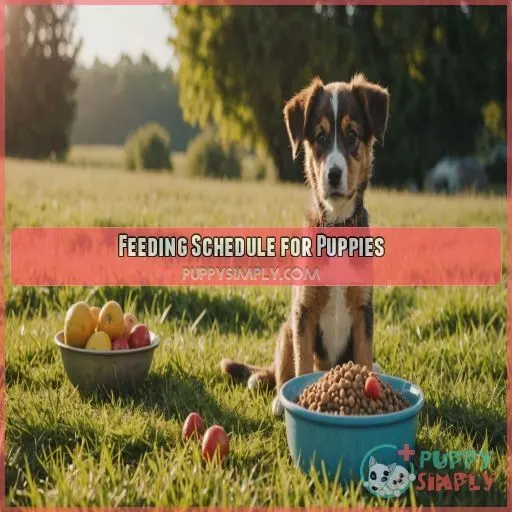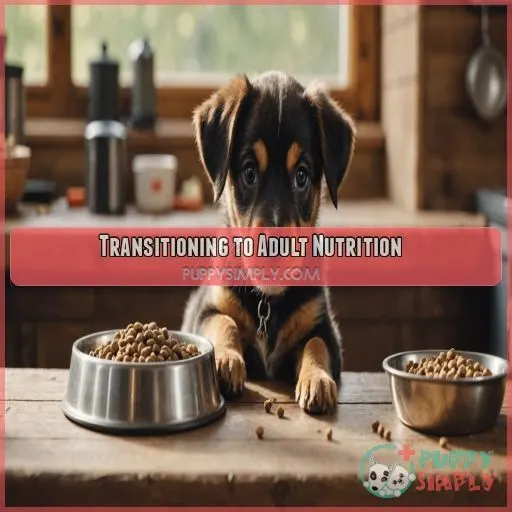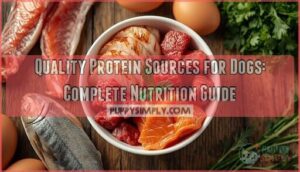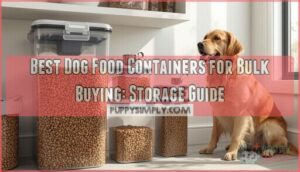This site is supported by our readers. We may earn a commission, at no cost to you, if you purchase through links.

High-protein and high-fat foods act as the main course, fueling muscle growth and boosting energy levels.
Cut back on carbs for portion control that’d make any personal trainer proud.
Mix in superfoods like blueberries for vitamins and antioxidants, ensuring they’re barking with health.
Always check for the AAFCO label for balanced meals, as your pup deserves only the best.
Stick around, and we’ll reveal the secret sauce to fine-tuning your puppy’s health journey!
Table Of Contents
- Key Takeaways
- Choosing Holistic Puppy Food
- Feeding Schedule for Puppies
- Nutritional Needs of Puppies
- Exercise and Fitness for Puppies
- Vaccinations and Puppy Health
- Holistic Nutrition for Puppies
- Transitioning to Adult Nutrition
- Frequently Asked Questions (FAQs)
- How do I feed my dog holistically?
- What is the most nutritious food for a puppy?
- What natural foods are good for puppies?
- What is holistic nutrition for dogs?
- What is the role of supplements in puppy diets?
- How does the breeding size affect dietary needs?
- Are there holistic remedies for preventing allergies in puppies?
- How can I ensure my puppys meal diversity?
- What are the benefits of organic puppy foods?
- Conclusion
Key Takeaways
- Fuel your pup’s growth and energy with a high-protein, high-fat diet that’s low in carbs – it’s like crafting a gourmet feast to keep them bouncing with health.
- Sprinkle in superfoods like blueberries and spinach to pack a vitamin and antioxidant punch, ensuring your furry friend is barking with joy.
- Follow the AAFCO guidelines to create a complete and balanced puppy formula, because your pup deserves only the best – it’s like being a personal trainer for their nutrition.
- Tailor your pup’s supplements to their age and needs, from joint support to brain development – it’s the secret sauce to fine-tuning their health journey.
Choosing Holistic Puppy Food
Choosing the right holistic puppy food is important for your furry friend’s healthy growth and development. With high-protein, high-fat formulas and limited carbs, you can give your pup the nutritional boost they need to thrive.
High-Protein, High-Fat Puppy Food Benefits
Everyone wants their furball bouncing with energy, right? High-protein, high-fat puppy food fuels muscle growth, energy levels, and an immune boost. It also jazzes up skin health and coat quality, making your pup the soon-to-be king of the dog park.
- Muscle growth
- Energy levels
- Immune boost
Importance of Limited Carbohydrates in Puppy Food
In puppy nutrition, limited carbohydrates can keep your pup feeling like a bouncy ball of energy. Grain-free diets help manage puppy growth and weight control, as excessive sugars from carbohydrate sources can lead to chubby puppies. Follow a puppy feeding guide for balanced nutrition.
Key Ingredients for Optimal Puppy Nutrition
Choosing the right ingredients for your puppy’s diet is a piece of cake when you know what to look for:
- Superfoods like blueberries and spinach boost vitamins and antioxidants.
- Protein sources such as chicken promote growth.
- Healthy fats help give your pup a shiny coat.
- Trace minerals support development.
AAFCO Guidelines for Complete and Balanced Puppy Food
When choosing puppy food, look for the AAFCO statement to make sure it’s complete and balanced. Avoid fillers and focus on high-quality protein, healthy fats, and limited carbs. The right puppy formula fuels their rapid growth and development. Your vet can help pick the perfect fit.
Feeding Schedule for Puppies
Creating a feeding schedule for your puppy is like planning a toddler’s day – it requires frequent meals, careful portion control, and a watchful eye on their growth. With a balanced approach, you’ll make sure your puppy moves smoothly from mother’s milk to solid food and eventually to adult nutrition, all while staying tail-waggingly healthy!
Transitioning From Mother’s Milk to Solid Food
Eventually, all puppies need to switch from milk to solid food gracefully. Here’s your guide:
- Use a puppy formula as a milk replacer.
- Introduce a weaning mix gradually.
- Solid food introduction by week eight helps puppies wean smoothly.
Frequency and Portion Control for Puppies
Once your puppy’s weaned, it’s time to whip out those schedules! Puppies eat frequently—like clockwork. Offer age-based portions with 3-4 meals daily. Don’t forget snack frequency for small breeds. Adjust puppy feeding time to keep them wagging their tails!
Monitoring Weight and Growth in Puppies
Monitoring your puppy’s weight and growth is key. Use a feeding chart, track their progress, and watch for healthy weight gain. Puppies have growth spurts – be ready to adjust their diet accordingly!
- Weigh your puppy regularly
- Consult a feeding chart for their age/breed
- Observe their body condition for good health
Gradually Transitioning to Adult Food
Switching your pup from puppy food to adult dog food is like teaching them to ride a bike. Gradually introduce adult food choices over seven days, ensuring food sensitivities don’t cause puppy weight gain. Keep an eye on timing changes and dog food ingredients!
Identifying Signs of Readiness for Adult Food
You’ve started adjusting your puppy’s food, so now watch for signs like puppy weight gain, appetite changes, or a waning interest in puppy food. Bowel changes and growth rate can also signal it’s time to think about adult dog food options.
Nutritional Needs of Puppies
Your puppy’s nutritional needs are all about finding the right balance of protein, fat, vitamins, and minerals to help them grow strong and healthy. Supplements can be a great way to give them what they need, based on their age and specific needs, making their tails wag even more!
Protein Requirements for Puppies
Puppies need the right protein sources for growth and muscle development. Different breeds have varying protein requirements—it’s not one-size-fits-all! Monitoring the feeding schedule prevents protein deficiency. Be sure to check dog food ingredients to meet essential nutritional requirements.
Importance of Fat for Immune Development
Healthy fats, like omega-3s, are very important for your puppy’s immune system. They support puppy health by improving gut health. Incorporating fatty acids in dog nutrition helps keep them strong and bouncy, turning an ordinary pup into a super-pup!
Vitamin and Mineral Needs for Puppies
You’ve got your pup’s fat intake sorted for a robust immune system, now let’s chat vitamins and minerals! Puppies have specific nutritional needs to stay healthy. Missing these can lead to puppy vitamin deficiencies. Here’s what they require:
- Calcium for strong bones
- Iron for oxygen transport
- Potassium to nerve fun
- Magnesium for energy
- Zinc for skin health
Role of Supplements in Puppy Nutrition
Supplements can enhance your puppy’s diet, providing targeted nutrients for digestive health, cognitive development, joint support, and immune function. Choose wisely to meet your pup’s changing needs as they grow.
Tailoring Supplements to Puppy Age and Needs
As your puppy grows, tailor supplements to their age and needs for the best possible health. Consider these puppy feeding tricks:
- Joint health: Start early to support growing bones.
- Brain development: Incorporate DHA-rich supplements.
- Digestive support: Use probiotics.
- Immune boosters: Provide essential vitamins.
Exercise and Fitness for Puppies
Keeping your puppy active is essential for their physical development and overall well-being, much like how a game of fetch can tire you out too. Just make sure you don’t overdo playtime, especially with large breeds, as their joints can be as delicate as your favorite porcelain mug!
Importance of Exercise for Physical Development
Keeping your puppy active is super important for their physical and mental development. Regular exercise tires them out, preventing destructive behaviors. Tailor activities to your pup’s age and breed to support healthy growth.
Exercise Needs for Large and Giant Breed Puppies
Giant and large breed puppies need careful exercise to help keep their joints healthy and control their growth like English Springer Spaniels. Consider these puppy exercise tips:
- Short walks
- Gentle play sessions
- Controlled stair use
- No jumping games
- Breed-specific safe activities
Keep it fun and safe!
Avoiding Overexertion and Joint Disorders
Every large breed puppy owner should exercise caution when setting exercise limits. Growth plates in puppies are like fragile china, so to prevent joint pain and help keep joints healthy, focus on gentle play. Avoid high-impact activities; safety first!
Maintaining a Fit Body Condition in Puppies
Want a fit puppy? Keep an eye on their weight. Balance playtime with proper feeding guidelines. Different breeds have different exercise needs, so consider a personalized exercise routine. Monitor their growth with dog food nutritional advice for a healthy pup.
Recognizing Proper Body Conformation for Controlled Growth
Who doesn’t love a plump puppy? But beware, a round puppy isn’t a healthy one. Focus on proper conformation:
- Use puppy weight charts.
- Understand growth plates.
- Consider exercise impact.
- Follow breed standards.
- Aim for ideal body condition scores.
Vaccinations and Puppy Health
Keeping your puppy healthy is really important, and a well-planned vaccination schedule is the key. From core vaccines to common disease prevention, we’ll walk you through the medical logic behind a solid vaccination program to keep your pup happy and healthy.
Core Vaccines for Puppies
You’ve jogged past puppy exercises; now focus on core vaccines. Immunize them with rabies and distemper shots to shield your furball. To keep your pup’s tail wagging, here’s a snapshot:
| Vaccine | Protection | Recommended Age |
|---|---|---|
| Rabies | Serious disease | 12-16 weeks |
| Distemper | Common illnesses | 6-8 weeks |
| Parvovirus | Life-threatening | 6-8 weeks |
Stay safe, protect your pal!
Strategic Vaccination Schedule for Puppies
Puppies need a strategic vaccination schedule during their first 4 months to protect against deadly diseases like distemper and parvo. Stay on top of those core shots – your pup’s health depends on it!
Medical Logic Behind Vaccination Programs
Let’s break it down: vaccines help supercharge your puppy’s immune system, acting like a tiny army ready to battle disease. Herd immunity is your goal. So, check the vaccine schedule and analyze dog food nutritional facts for heart health support learn about Bernese Mountain Dog health considerations.
Importance of Vaccination for Puppy Health
Vaccinating your puppy is like giving them a superhero cape—it bolsters their puppy immunity against villains lurking in the world. A well-planned vaccine schedule is key for disease prevention, ensuring puppy safety whether they’re a small breed or on a raw diet.
Common Diseases Protected by Vaccines
Vaccines shield your pup from nasty bugs like distemper, parvo, and rabies – scary illnesses that can really ruin their day. Protect your furry friend with this essential care!
Holistic Nutrition for Puppies
Help your puppy reach their full potential with holistic nutrition, focusing on natural, whole foods that nurture growth and well-being. Say goodbye to processed kibble and embrace a wholesome diet that even your picky pup will "pawsitively" love!
Definition of Holistic Nutrition for Dogs
Holistic nutrition for dogs means embracing natural ingredients and a whole food diet. Imagine a fresh salad over a TV dinner—same idea here! Avoid processed foods, consider raw feeding and smart supplement use. It’s like crafting a canine culinary masterpiece!
Benefits of Holistic Nutrition for Puppies
Holistic puppy nutrition isn’t just a fancy term; it’s a game-changer for your furry friend! You’ll boost immune support, enhance coat health, and improve energy levels. Here’s why holistic diets matter:
- Gut health focus
- Reduce allergies
- Promote health
Natural Foods for Puppies
You’ve heard the buzz about natural foods, so let’s chew on it. Opting for raw feeding or homemade recipes with organic ingredients can work wonders. Add a dash of superfood and sprinkle in benefits galore! Commercial brands can’t compete.
| Delightful | Nutritious ❤️ |
|---|---|
| 凌 Carrots | Enhanced vision |
| Apples | Crunchy treats |
| 𢡄 Berries | Antioxidant burst |
| Spinach | Iron boost |
Importance of Whole Foods in Puppy Nutrition
Whole foods are the foundation of holistic puppy nutrition. They provide:
- Nutrient-dense superfoods like blueberries, spinach, and sweet potatoes.
- Natural antioxidants and phytonutrients for immune support.
- Fiber-rich ingredients to promote healthy digestion.
Avoiding Processed Foods in Puppy Diets
Embrace nature, ditch processed, and see your puppy thrive! Opt for natural ingredients like apples and spinach. Check out homemade recipes or try raw feeding. Avoid food allergies and explore grain-free diets. Your puppy’s health will thank you!
Transitioning to Adult Nutrition
Switching your puppy to adult food is a key step, much like moving from training wheels to a two-wheeler. You’ll want to make this change gradually, ensuring your puppy’s growth stays on the right track while preventing any unexpected spills along the way.
Signs of Readiness for Adult Food
Noticing your puppy‘s growing appetite and waning interest in puppy food? That’s a telltale sign they’re ready to graduate to adult chow. Time to start the switch – your vet can guide the perfect pace.
Gradual Transition to Adult Food
So, your little buddy’s starting to show signs of maturity—time to switch chow! Follow this pawsome food switching schedule to start:
- 25% adult food days 1-2
- 50% by days 3-4
- Increase gradually until fully swapped!拾
Importance of Monitoring Weight and Growth
Your puppy’s growth journey is like watching a flower bloom—completely magical. Use puppy weight charts to track growth milestones, ensuring they stay within a healthy weight range. This helps dodge overfeeding risks and implement weight loss strategies early if needed.
Avoiding Overfeeding and Obesity
Puppy weight is like a well-tended garden; keep it blossoming by mastering portion control. Meeting calorie needs without overindulging on treats helps create a happy, healthy pup. Adjust portions based on activity levels to prevent obesity, promoting lifelong wellness.
Choosing the Right Adult Food for Your Puppy
As you manage your puppy’s weight, finding the right food is key. Think of adult food benefits like adding vegetables to your own diet like a raw food diet. Check the ingredients and make sure it supports your pup’s growth, just like a personal trainer would!
Frequently Asked Questions (FAQs)
How do I feed my dog holistically?
To feed your dog holistically, choose high-quality, minimally processed dog food made with whole, natural ingredients like meat, fruits, and vegetables. Avoid fillers, by-products, and artificial additives. (Source)
What is the most nutritious food for a puppy?
Surprise, surprise! The most nutritious puppy food isn’t the cheap mystery-meat kind, but rather one that’s packed with high-quality ingredients. Choose a high-protein, high-fat option like Earthborn Holistic, rich in superfoods like apples and spinach, to help your pup grow strong and have a shiny coat.
What natural foods are good for puppies?
For your puppy’s nutrition, think of their diet as a balanced smoothie! Include superfoods like apples, blueberries, carrots, and spinach. These natural goodies pack a punch with vitamins, minerals, and antioxidants, ensuring your pup grows strong and healthy.
What is holistic nutrition for dogs?
Think of holistic dog nutrition as a symphony for your pup’s well-being. You’d focus on balanced dog food, rich in protein and healthy fats, incorporating natural ingredients and supplements, ensuring their health and happiness hit the high notes.
What is the role of supplements in puppy diets?
Supplements in a puppy’s diet act like adding extra fuel to a fire. They support digestive health, brain development, joints, and immunity. Tailor these boosters to your pup’s age, ensuring they grow into healthy adults.
How does the breeding size affect dietary needs?
Breeding size affects your puppy’s dietary needs like a recipe for the perfect cake. Large breeds need more calories and nutrients for growth, while small breeds thrive with fewer calories but need frequent meals to stay energized.
Are there holistic remedies for preventing allergies in puppies?
Just like Superman’s kryptonite, allergies can be a puppy’s nemesis. Focus on holistic diets rich in omega-3 fatty acids, probiotics, and antioxidants. These can help strengthen their immune system and potentially stave off pesky allergies.
How can I ensure my puppys meal diversity?
To make sure your puppy’s meal diversity, mix high-quality wet and dry foods, rotate protein sources like chicken or fish, and add puppy-safe veggies. It keeps meals exciting and guarantees a nutritional jackpot for your furry friend!
What are the benefits of organic puppy foods?
You might wonder why organic puppy foods are worth it. Well, they’re like a fresh start for your pup! With fewer pesticides and artificial ingredients, they promote healthier growth and can boost immunity naturally.
Conclusion
Taking a page from "The Secret Garden," cultivating a holistic puppy nutrition plan is like tending to your pup’s blooming health.
By focusing on high-protein, high-fat diets, nutrient-rich superfoods, and following AAFCO guidelines, you’re fueling their growth and energy.
Balancing nutrition with exercise keeps them spirited and strong.
Embrace this nourishing journey as a part of your bond; remember, a healthy puppy today sprouts into a robust canine companion tomorrow bouncing through life by your side!













